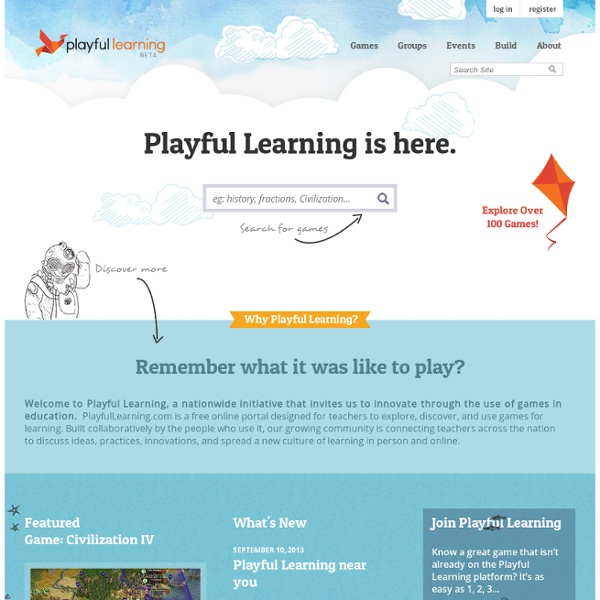



playforce.org - Playforce: Learning from the games we play SimCityEDU | Create & Share SimCity Learning Tools Games For Learning Institute Digital Games Transforming K-12 Assessment and Learning Many teachers are searching for new ways to engage their digital-native students. They are looking for, write researchers at Florida State, “alternative ways of teaching – ways that increase student engagement and yield a rich, authentic picture of the learner(s).” These researchers say more educators should take a look at the latest in digital games. Games that are designed not only to teach, but to help educators assess learning as it’s happening. GlassLab, a new nonprofit educational game design initiative, has just released its first game— SimCityEdu—based on the popular Simcity brand and called SimCityEDU: Pollution Challenge! The Games, Learning, and Assessment Lab, or GlassLab is a unique partnership between the nonprofit Institute of Play (known for their Quest to Learn schools), the game-design firm Electronic Arts, and others. “One of the things that we all get frustrated with is that kids get assessed in the spring and they get that data and feedback back in the fall.
Gaming the Past | historical simulation games in the classroom 34 Smart Ideas For Using Smartphones In The Classroom 34 Smart Ideas For Using Smartphones In The Classroom 34 Ways Ideas For Smartphones In The Classroom By Category by John Hardison first appeared on gettingsmart.com In continuation of last week’s article, Part 1: 44 Better Ways to Use Smartphones in Class, here is a new list of thirty-six additional ideas to help leverage the power of these tech gadgets in the learning environment. In this blog post, I have attempted to avoid any redundancies. Please join me in helping educators everywhere creatively use smartphones by contributing any overlooked uses and supportive responses via this survey. 34 Smart Ideas For Using Smartphones In The Classroom To Collaborate 1. 2. 3. 4. 5. To Communicate 6. This method encourages educators to abandon the time-consuming and inefficient task of periodically calculating the data. 7. 8. To Create 9. 10. 11. 12. 13. 14. 15. 16. 17. 18. 19. 20. 21. 22. 23. 24. 25. 26. 27. 28. To Curate/Coordinate 29. 30. 31. 32. 33. 34. Still not convinced?
Serious Games Directory BETA | 6 Great Note-Taking Tools for Students and Teachers One of the best things about education technology is that it has allowed students and teachers alike to turn to online annotation and records, making hastily scrawled, illegible scribbles and coffee-stained pages a thing of the past. From university students keeping track of lectures to young students making plans and mind maps, there is an online note-taking tool to suit everyone… 1. Study Blue A great site that allows students to create online flash cards, study guides and quizzes. These learning resources are stored online, making heavy folders and easily-misplaced notebooks redundant, as students can simply login anywhere anytime and use their notes to revise, or test themselves using their flashcards. 2. A brilliantly simple online interactive whiteboard, Scriblink allows notes to be shared as they’re created. 3. Perfect for individual students, Penzu is the online version of the old-fashioned notebook or journal in which you build up your body of lecture or class notes. 4. 5. 6.
Solving the World - Serious Games Require Serious Gamers | Curiouser Institute Every day gamers go into fictional spaces to save the world. They go on quests to save the Mario Galaxy, battle evil in Azeroth, and improve their lots in Farmville. Millions of gamers spend in the area of 3 billion hours a week solving the difficult and challenging problems of hundreds of fictional worlds and thousands of quests. Until lately that didn't really have much of an effect on the real world. However with the rise of Serious Gaming, a movement that explores the uses of games beyond "entertainment", video games and the real world have become entwined. The ability of games to now reach out into the real world brings up a tantalizing question. Like puzzles? The term "serious gaming" is a useful, but in some ways unfortunate term. Current games are packed with psychologically rich content which is highly reflective and connected to our inner life. This is what makes the games so vitally important to us. The players' intention is the key.
Classmint.com - Online Cornell Notes, Flashcards and Study Groups Game Theory, Popular Science On test day for my Behavioral Ecology class at UCLA, I walked into the classroom bearing an impossibly difficult exam. Rather than being neatly arranged in alternate rows with pen or pencil in hand, my students sat in one tight group, with notes and books and laptops open and available. They were poised to share each other's thoughts and to copy the best answers. As I distributed the tests, the students began to talk and write. All of this would normally be called cheating. Who in their right mind would condone and encourage cheating among UCLA juniors and seniors? The students began to talk and write. Nevertheless, I'm a realist. Much of evolution and natural selection can be summarized in three short words: "Life is games." So last quarter I had an intriguing thought while preparing my Game Theory lectures. A week before the test, I told my class that the Game Theory exam would be insanely hard—far harder than any that had established my rep as a hard prof. Gasps filled the room.